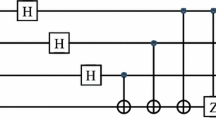Abstract
Owing to the disadvantages of low communication efficiency, high measuring complexity and implementation difficulties in the existing quantum state sharing protocols, an efficient and simple three-party deterministic quantum state sharing protocol based on Bell states is proposed. During the procession of the protocol, only Bell-state measurements is used and the communication efficiency is improved obviously, hence, the proposed protocol is easily realized in physical experiment and its successful probabilities be all 100%. On the other hand, the protocol is generalized from three parties to multiple parties, and the feasibility of the scheme is illustrated by taking the four-party quantum state sharing as an example.



Similar content being viewed by others
References
Brassard C, Bennett C. H. Quantum Cryptography: Public Key Distribution and Coin Tossing[C]//International Conference on Computers, Systems and Signal Processing. 1984
Hillery, M., Bužek, V., Berthiaume, A.: Quantum secret sharing[J]. Phys. Rev. A. 59(3), 1829 (1999)
Cleve, R., Gottesman, D., Lo, H.K.: How to share a quantum secret[J]. Phys. Rev. Lett. 83(3), 648 (1999)
Deng, F.G., Li, X.H., Li, C.Y., et al.: Multiparty quantum-state sharing of an arbitrary two-particle state with Einstein-Podolsky-Rosen pairs[J]. Phys. Rev. A. 72(4), 044301 (2005)
Gao, T., Yan, F.L., Li, Y.C.: Quantum secret sharing between m-party and n-party with six states[J]. Sci. China, Ser. G. 52(8), 1191–1202 (2009)
Lian-Fang, H., Yi-Min, L., Hao, Y., et al.: Efficient multiparty-to-multiparty quantum secret sharing via continuous variable operations[J]. Chin. Phys. Lett. 24(12), 3312 (2007)
Qunyong, Z.: Quantum secret sharing of single-qubit state via tripartite entangled states[J]. Chinese Journal of Quantum Electronics. 29(4), 421 (2012)
Hsieh, C.R., Tasi, C.W., Hwang, T.: Quantum secret sharing using GHZ-like state[J]. Commun. Theor. Phys. 54(6), 1019 (2010)
Xin-Mei, S., Xin-Wei, Z., Jian-Xia, Q., et al.: High-efficient quantum state sharing via non-maximally five-qubit cluster state[J]. Acta Phys. Sin. 2013(23), 4 (2013)
Wang, W., Cao, H.: An improved multiparty quantum secret sharing with bell states and bell measurement[J]. Int. J. Theor. Phys. 52(6), 2099–2111 (2013)
Liao, C.H., Yang, C.W., Hwang, T.: Dynamic quantum secret sharing protocol based on GHZ state[J]. Quantum Inf. Process. 13(8), 1907–1916 (2014)
Nie, Y., Xu, Y., Li, Y., et al.: Quantum state sharing of an arbitrary three-atom state by using five-atom cluster state in cavity QED[J]. Int. J. Theor. Phys. 53(4), 1299–1307 (2014)
Peng, J.Y., Bai, M., Mo, Z.W.: Bidirectional quantum states sharing[J]. Int. J. Theor. Phys. 55(5), 2481–2489 (2016)
Ahmadi, M., Wu, Y.D., Sanders, B.C.: Relativistic (2, 3)-threshold quantum secret sharing[J]. Physical Review D. 96(6), 065018 (2017)
Wang, J., Li, L., Peng, H., et al.: Quantum-secret-sharing scheme based on local distinguishability of orthogonal multiqudit entangled states[J]. Phys. Rev. A. 95(2), 022320 (2017)
Qin, H., Dai, Y.: Dynamic quantum secret sharing by using d-dimensional GHZ state[J]. Quantum Inf. Process. 16(3), 64 (2017)
Kogias, I., Xiang, Y., He, Q., et al.: Unconditional security of entanglement-based continuous-variable quantum secret sharing[J]. Phys. Rev. A. 95(1), 012315 (2017)
Wang, X.J., An, L.X., Yu, X.T., et al.: Multilayer quantum secret sharing based on GHZ state and generalized bell basis measurement in multiparty agents[J]. Phys. Lett. A. 381(38), 3282–3288 (2017)
Hao, C., Wenping, M.: (t, n) threshold quantum state sharing scheme based on linear equations and unitary operation[J]. IEEE Photonics Journal. 9(1), 1–7 (2017)
Cao, H., Ma, W.: Verifiable threshold quantum state sharing scheme[J]. IEEE Access. 6, 10453–10457 (2018)
Acknowledgments
This work was supported by Dongguan Science and Technology Development Foundation(Grant No.2019507151569).
Author information
Authors and Affiliations
Corresponding author
Additional information
Publisher’s Note
Springer Nature remains neutral with regard to jurisdictional claims in published maps and institutional affiliations.
Rights and permissions
About this article
Cite this article
MA, Ly. Two-Qubit Quantum State Sharing Protocol Based on Bell State. Int J Theor Phys 59, 1844–1853 (2020). https://doi.org/10.1007/s10773-020-04451-y
Received:
Accepted:
Published:
Issue Date:
DOI: https://doi.org/10.1007/s10773-020-04451-y



